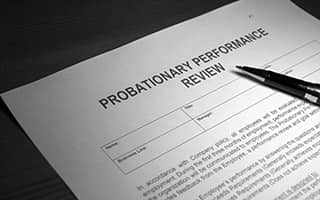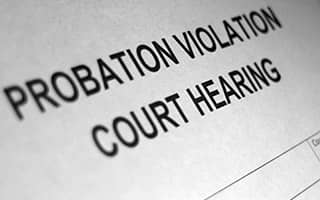Instant Court Case Lookup
The following is for information purposes only
Table of Contents
Probation

Probation is a court-ordered alternative to incarceration that allows individuals to remain in the community under structured supervision rather than serving time in jail or prison. It functions as an intermediate sanction, allowing offenders to maintain employment, access treatment services, and preserve family and community ties while still being held accountable for their actions.
The primary purpose of probation is to support rehabilitation, accountability, and the successful reintegration of offenders into the community.
Probation differs from parole in timing and authority: probation is imposed at sentencing as an alternative to incarceration, while parole is a conditional release granted after serving part of a prison sentence.
Historically, probation emerged in the 19th century as a reform-oriented response to overcrowded prisons and the recognition that many offenders benefit more from community-based supervision than confinement. Modern probation systems have evolved into an evidence-based system widely used across the United States.
Types of Probation
Probation takes several forms, each tailored to an individual's risk level, the severity of the offense, and rehabilitation needs.
-
Supervised Probation: Supervised probation is the most common model of community supervision, requiring regular check-ins with a probation officer. Individuals must report regularly to a probation officer, who monitors their compliance with court-ordered requirements such as counseling, employment, drug testing, or community service.
The frequency of check-ins depends on the offender's progress and risk level. Non-compliance, including missed opportunities or new offenses, may trigger a violation hearing and potential jail time.
-
Unsupervised Probation: Unsupervised, or informal, probation applies to low-risk or first-time offenders whose conduct does not require ongoing officer oversight. Instead of check-ins, the individual must independently complete all court conditions, such as paying fines or completing educational programs, and refrain from committing new offenses.
-
Intensive Probation: Intensive probation supervision (IPS) represents the highest level of community monitoring. It includes frequent reporting, unannounced home visits, strict curfews, and sometimes electronic tracking. IPS is generally used for high-risk or repeat offenders as an alternative to incarceration.
-
Shock Probation: Shock probation involves a brief period of incarceration followed by release into probation. The "shock" of jail time is intended to deter future criminal behavior and demonstrate the consequences of continued offending.
Courts typically apply this option for young or first-time adult offenders who may respond to a short but impactful custodial experience.
-
Juvenile Probation: Juvenile probation is specifically designed for youth offenders and focuses heavily on rehabilitation, education, and behavioral change rather than punishment. Officers work closely with families, schools, and service providers to address educational, social, or emotional needs.
Juvenile probation typically includes school attendance, counseling, curfews, family involvement, and community-based interventions.
Probation Conditions and Requirements
Probation conditions and requirements establish the framework for community supervision and ensure the individual's successful reintegration while maintaining public safety.
-
Standard Conditions: Standard probation conditions are foundational rules designed to ensure public safety and personal accountability. These typically include:
-
Obeying all laws.
-
Reporting regularly to a probation officer.
-
Maintaining lawful employment or education.
-
Residing at an approved address.
Probationers should inform their parole officer before changing residences, traveling, or associating with known offenders. Failing to comply with these requirements can lead to formal review or sanctions.
-
-
Special Conditions: These are probation requirements specifically tailored to the offender's circumstances or the nature of their offense. The courts may order drug or alcohol testing, mandatory counseling, restitution payments, community service, restrictions on internet or weapon use, and electronic or GPS monitoring to enforce curfews or location limits. Individuals convicted of financial crimes may face audit requirements, while domestic violence cases typically require batterer intervention programs.
The consequences of violating probation terms vary. Depending on the severity and state laws, the courts may issue warnings, add new conditions, or impose stricter supervision for missed appointments. Substantive violations, such as new criminal activity, can result in short jail sanctions, probation revocation, and incarceration.
Probation officers play a critical enforcement role, monitoring compliance, verifying employment or residence, conducting home visits, and facilitating access to treatment or support services. Their reports inform judicial decisions and help balance rehabilitation goals with public safety.
Violations and Revocation of Probation

Probation violations are classified as technical, such as missed appointments, failed drug tests, or curfew breaches, or substantive, involving new criminal offenses. Alleged violations trigger a revocation hearing, during which the court reviews the probation officer's report and decides whether the individual failed to comply with probation terms.
Possible outcomes include reinstating probation, modifying conditions with stricter supervision, short-term incarceration, or activating the original sentence. Defendants retain their due process rights during revocation proceedings, including notice of the alleged violations, the opportunity to present evidence, and the right to confront witnesses. In some jurisdictions, they also have the right to be represented by counsel, ensuring a fair adjudication of compliance.
Federal vs. State Probation Systems
Federal probation is managed by the U.S. Probation and Pretrial Service System, which supervises individuals convicted of federal offenses. Officers conduct presentence investigations, monitor compliance, enforce conditions, and support reentry through counseling, employment assistance, and electronic monitoring, in compliance with standardized federal guidelines.
State probation systems operate under state laws and local statutes, with supervision handled by county courts, departments of corrections, or local agencies. Practices vary in intensity, eligibility, and rehabilitative focus.
For example, California emphasizes county-level rehabilitation programs. Texas combines supervision with accountability initiatives through Community Supervision and Corrections Departments, while New York uses a hybrid model with local departments under state oversight.
Public Access to Probation Records
Probation records typically contain court judgments, sentencing orders, conditions of probation, compliance reports, violation notices, and the result of any revocation proceedings. Additionally, they may also include risk assessments, participation in counseling or rehabilitation programs, and restitution or community service records.
Public vs. Sealed Records
Adult probation records are generally considered public under state open records or court transparency laws. Publicly accessible information often includes case numbers, sentencing dates, and docket entries.
However, records may be sealed or restricted for juveniles, medical or mental health evaluations, sensitive case details, or court-ordered confidentiality. Access to these records is typically restricted to protect the privacy of the victims and witnesses.
How to Search Probation Records Online
The State Department of Corrections maintains offender databases for individuals under supervision. County court portals allow searches by name, case number, or filing date, displaying probation-related docket entries.
Federal probation information can be accessed through PACER (Public Access to Court Electronic Records), providing court documents and probation orders for a nominal fee.
Accessing Probation Records Offline
Offline access to probation records requires contacting the county clerk's office or the probation department directly. Requesters typically need to provide a valid identification and may pay a nominal administrative fee to retrieve the record. The office also provides copies of probation records, ideal for legal verification, background checks, or expungement purposes.
Frequently Asked Questions About Probation
Here are answers to questions commonly asked about probation.
How is probation different from parole?
Probation is a court-ordered sentence allowing offenders to remain in the community instead of serving time in prison. Parole, in contrast, is conditional release after serving part of a prison term, subject to supervision and specific conditions.
Who qualifies for probation instead of jail time?
Eligibility for probation depends on factors such as the type of offense, prior criminal history, and risk assessment. Nonviolent offenders, first-time offenders, or those demonstrating rehabilitation potential are more likely to receive probation.
How long does probation usually last?
The probation period typically ranges from six months to five years, depending on state laws, the severity of the offense, and individual circumstances.
What are the standard conditions of probation?
The standard conditions of probation include obeying all laws, reporting to a probation officer, maintaining employment, attending counseling, and avoiding drugs, alcohol, and firearms.
Can probation be terminated early?
Yes, probation can be terminated early. The courts may grant early termination for full compliance, exemplary behavior, or completion of the required programs or restitution.
Can you travel or move to another state while on probation?
Yes, you can. However, travel or relocation generally requires written approval from your probation officer or the court. Unauthorized movement may be considered a violation of your probation.
Is probation considered a criminal conviction?
Yes. Probation forms part of the criminal sentences and appears on all public record searches, unless the record is expunged or dismissed.
Can you get a job while on probation?
Yes. Employment is typically required during the probation period. However, not all jobs are available to persons on probation, particularly those involving security, firearms, or other restricted duties.
What rights do you lose while on probation?
Probation limits your right to own firearms, vote, and travel at will, depending on state laws and case type.
How can you find out if someone is on probation?
You can find out if a person is on probation by searching county court portals or state offender databases. Additionally, contact your local probation departments for probation records.
What is the difference between supervised and unsupervised probation?
Supervised probation requires the offender to report regularly to their probation officer. On the contrary, an unsupervised probation relies on the offenders' self-compliance without direct supervision.